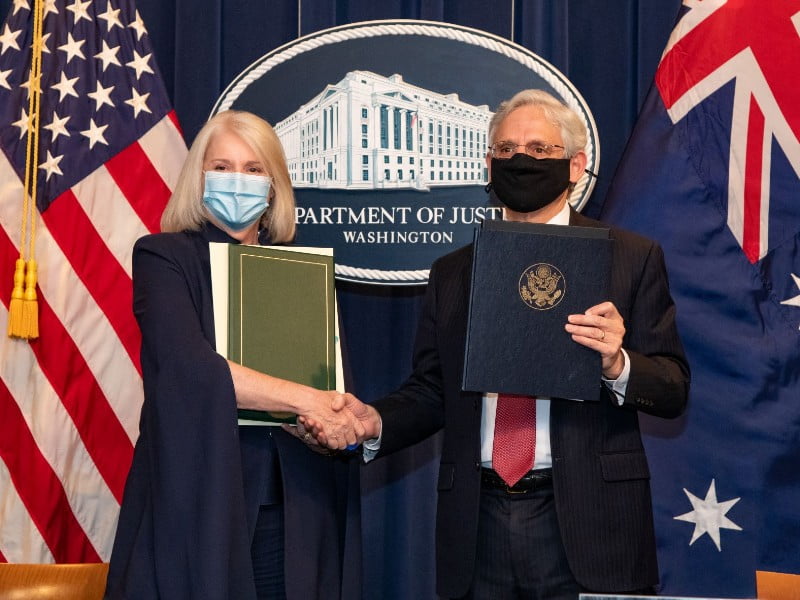Australia has secured an expedited data-sharing deal with the United States, but won’t be able to officially sign it until the second half of next year, after the federal election.
The two nations said overnight that they had reached an agreement under the US Clarifying Lawful Overseas Use of Data (CLOUD) Act, passed in 2018, to facilitate the quicker sharing of electronic data for law enforcement purposes.
Australia has been in negotiations with the US on this deal since late 2019. It will allow Australian law enforcement agencies to directly request data from a US company without going through its US counterpart, and vice versa.

A CLOUD Act deal has strong bipartisan support in Australia, despite concerns of the privacy and human rights impact of such a deal.
But while an agreement has been finalised, the deal won’t be able to actually be signed until the second half of next year.
Experts have questioned why Australia is entering into a significant international data-sharing agreement while it is in the midst of a major review of domestic electronic surveillance laws, and critics have also raised concerns with the privacy and human rights implications of the deal.
Under legislation passed earlier this year to facilitate such an agreement, the deal must be tabled in Parliament and 15 sitting days be given for either house of Parliament to block it. With Parliament not sitting again until February, and only 10 sitting days until the likely May election, the deal won’t be signed before then.
US Attorney-General Merrick B Garland said the deal would give law enforcement timely access to data to prevent, detect, investigate and prosecute serious crimes such as ransomware attacks and the sabotaging of critical infrastructure over the internet.
“This agreement paves the way for more efficient cross-border transfers of data between the United States and Australia so that our governments can more effectively counter serious crime, including terrorism, while adhering to the privacy and civil liberties values that we both share,” Mr Garland said.
It’s the second CLOUD Act agreement to be launched, with the US already securing one with the UK in 2019.
Australian Home Affairs Minister Karen Andrews also welcomed the data-sharing agreement.
“By strengthening both nations’ ability to fight crime, and giving our law enforcement agencies more efficient access to evidence, we’re ensuring the safety, security and prosperity of our citizens,” Ms Andrews said.
The CLOUD Act deal comes just days after the federal government began consulting on major reviews to domestic electronic surveillance laws.
Deakin University senior lecturer Dr Monique Mann said it’s “premature” to move ahead with a data-sharing deal before these reforms are completed.
“It’s very typical of the Australian governemnt to be announcing these types of things in the imediate lead up to the holiday period, which also impacts the ability to have robust review mechanisms and input from civil society and other experts,” Dr Mann told InnovationAus.
“It’s premature for the Australian government to be entering into these types of agreements when we’re currently undergoing a process of reform of the electronic communications surveillance framework. Until we’ve gotten through those sorts of processes it doesn’t make sense to be entering into these broader international arrangements.”
Dr Mann also said giving Australian authorities the ability to directly request data from US tech giants may undermine human rights protection laws.
“There are a whole range of issues with this circumventing of the traditional neutral legal assistance treaty request processes, ensuring that due process is upheld and going directly to the tech companies is circumventing these safeguards,” she said.
Legislation facilitating this deal, known as the International Production Orders, was passed by Parliament in June with bipartisan support, without a debate.
The government implemented a number of recommendations in line with the Parliamentary Joint Committee on Intelligence and Security recommendations, including the ability for either house to reject a deal, and for Australia to consider the respect for the rule of law and human rights in a foreign country before inking one.
This year’s federal budget provided just under $10 million over four years for the CLOUD Act deal.
While both major parties support such an agreement, the Greens voiced “grave concerns” with the proposal, saying there are a lack of protections and a lack of parameters in the bill.
An international coalition of tech groups also wrote to the government with concerns, saying that it “does not provide adequate safeguards to protect human rights”.
Do you know more? Contact James Riley via Email.

